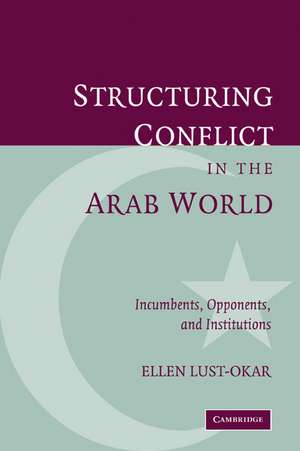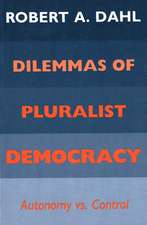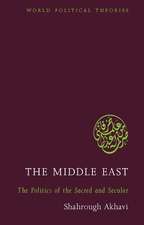Structuring Conflict in the Arab World: Incumbents, Opponents, and Institutions
Autor Ellen Lust-Okaren Limba Engleză Paperback – 24 ian 2007
| Toate formatele și edițiile | Preț | Express |
|---|---|---|
| Paperback (1) | 287.07 lei 6-8 săpt. | |
| Cambridge University Press – 24 ian 2007 | 287.07 lei 6-8 săpt. | |
| Hardback (1) | 684.57 lei 6-8 săpt. | |
| Cambridge University Press – 9 ian 2005 | 684.57 lei 6-8 săpt. |
Preț: 287.07 lei
Nou
Puncte Express: 431
Preț estimativ în valută:
54.94€ • 57.01$ • 45.92£
54.94€ • 57.01$ • 45.92£
Carte tipărită la comandă
Livrare economică 17-31 martie
Preluare comenzi: 021 569.72.76
Specificații
ISBN-13: 9780521032865
ISBN-10: 0521032865
Pagini: 296
Ilustrații: 7 b/w illus. 6 tables
Dimensiuni: 151 x 229 x 17 mm
Greutate: 0.44 kg
Ediția:Revised
Editura: Cambridge University Press
Colecția Cambridge University Press
Locul publicării:Cambridge, United Kingdom
ISBN-10: 0521032865
Pagini: 296
Ilustrații: 7 b/w illus. 6 tables
Dimensiuni: 151 x 229 x 17 mm
Greutate: 0.44 kg
Ediția:Revised
Editura: Cambridge University Press
Colecția Cambridge University Press
Locul publicării:Cambridge, United Kingdom
Cuprins
List of figures and tables; Acknowledgments; A note on the use of language; Abbreviations; Introduction; 1. The manipulation of political opposition; 2. Structures of contestation; 3. Playing by the rules: the inclusion and exclusion of political oppositions; 4. Dynamics of opposition in unified SoCs; 5. Opposition dynamics in divided SoCs; 6. Formal SoCs and informal political manipulation; Conclusion; Appendix: political forces in Egypt, Jordan and Morocco; Notes; Bibliography; Index.
Recenzii
'For more than a decade, observers have been puzzled by the failure of the opposition in the Arab world to take advantage of timid regime liberalizations to push harder for genuine democratic reform. Now we have the answer. In this remarkable - indeed, almost unique - marriage of thorough field research in the Arab world and rigorous formal modelling, Lust-Okar explains how regimes write rules that discourage opposition groups from mobilization, even when they have the resources to do so. This book is an all too-rare treat, a work that deploys real science to illuminate real politics.' Lisa Anderson, Columbia University
'Regimes in liberalizing countries are sometimes faced with a united and relatively cohesive opposition pushing for greater freedoms, and sometimes faced with a fragmented and divided opposition that does not take advantage of available opportunities to forge a more democratic country. What explains this important difference? Drawing on cases primarily from the Arab world, Lust-Okar uses game theory to convincingly argue how state policies fundamentally shape oppositional choices and politics. this brilliant book makes an original contribution to the debates on democratization in the Middle East and beyond. Highly recommended.' Glenn Robinson, Naval Postgraduate School
'This is an ambitious and innovative study, offering generalizable theoretical insights that account for variance in the approach of opposition political movements to popular dicsontent and unrest. Drawing upon both the conceptual tools of analytical political science and an area specialist's knowledge of the Arab world, Lust-Okar makes the kind of scholarly contribution that is all too rare in research on the Middle East.' Mark Tessler, University of Michigan
'By forcefully drawing attention to the ways in which heretofore neglected fomal institutions shape the strategies of incumbent opposition elites in repressive dictatorships, Ellen Lust-Okar recasts our understanding of the divergent dynamics of protest triggered by economic crisis. Making judicious use of formal models, she advances nover hypotheses about when moderate opposition elites will exploit mass discontent to press demands for political change. Detailed case studies based on extensive primary research persuasively highlight the significance of unified versus divided structures of contestation. This important book is an exemplar of methodological rigor and pluralism, one that sets an impressibley high standard for subsequent works that will build on its insights to further analyze the dynamics of contention and political liberalization in the Middle East and beyond.' David Waldner, University of Virginia
'Regimes in liberalizing countries are sometimes faced with a united and relatively cohesive opposition pushing for greater freedoms, and sometimes faced with a fragmented and divided opposition that does not take advantage of available opportunities to forge a more democratic country. What explains this important difference? Drawing on cases primarily from the Arab world, Lust-Okar uses game theory to convincingly argue how state policies fundamentally shape oppositional choices and politics. this brilliant book makes an original contribution to the debates on democratization in the Middle East and beyond. Highly recommended.' Glenn Robinson, Naval Postgraduate School
'This is an ambitious and innovative study, offering generalizable theoretical insights that account for variance in the approach of opposition political movements to popular dicsontent and unrest. Drawing upon both the conceptual tools of analytical political science and an area specialist's knowledge of the Arab world, Lust-Okar makes the kind of scholarly contribution that is all too rare in research on the Middle East.' Mark Tessler, University of Michigan
'By forcefully drawing attention to the ways in which heretofore neglected fomal institutions shape the strategies of incumbent opposition elites in repressive dictatorships, Ellen Lust-Okar recasts our understanding of the divergent dynamics of protest triggered by economic crisis. Making judicious use of formal models, she advances nover hypotheses about when moderate opposition elites will exploit mass discontent to press demands for political change. Detailed case studies based on extensive primary research persuasively highlight the significance of unified versus divided structures of contestation. This important book is an exemplar of methodological rigor and pluralism, one that sets an impressibley high standard for subsequent works that will build on its insights to further analyze the dynamics of contention and political liberalization in the Middle East and beyond.' David Waldner, University of Virginia
Notă biografică
Descriere
This book examines how ruling elites manipulate political opponents in the Middle East.














